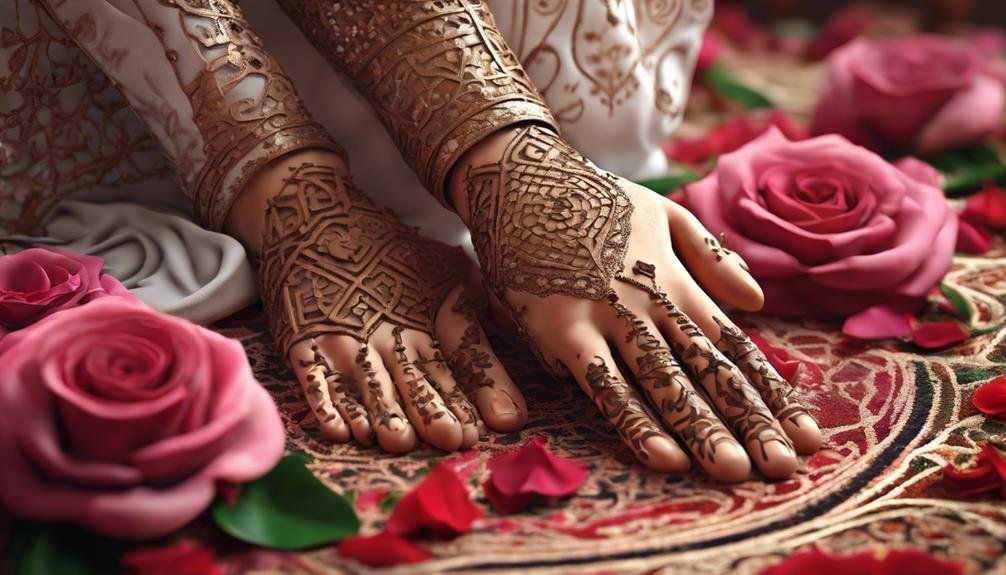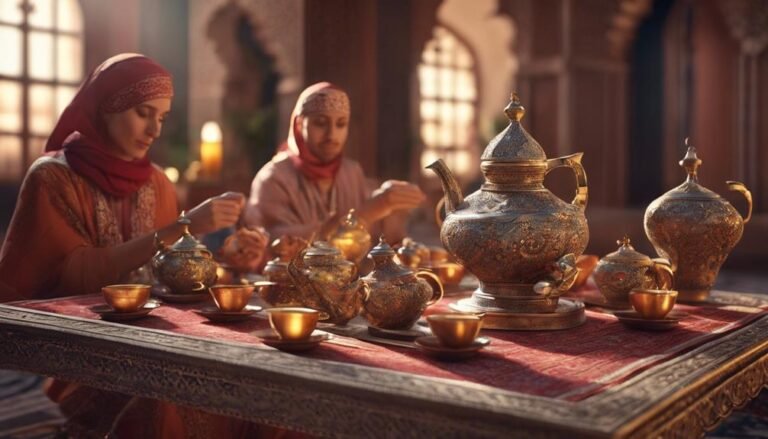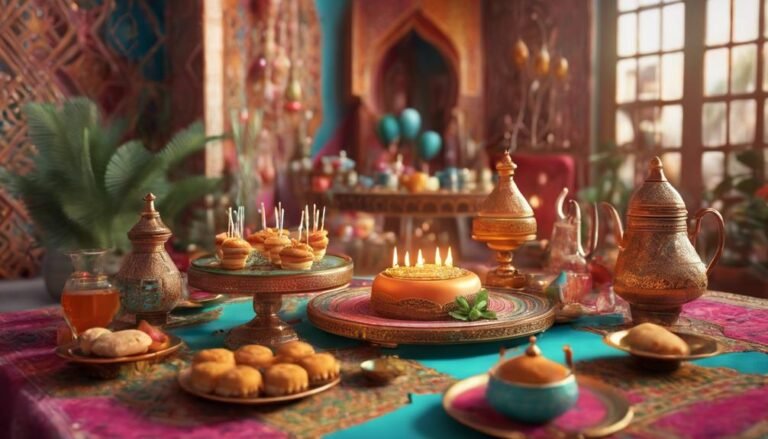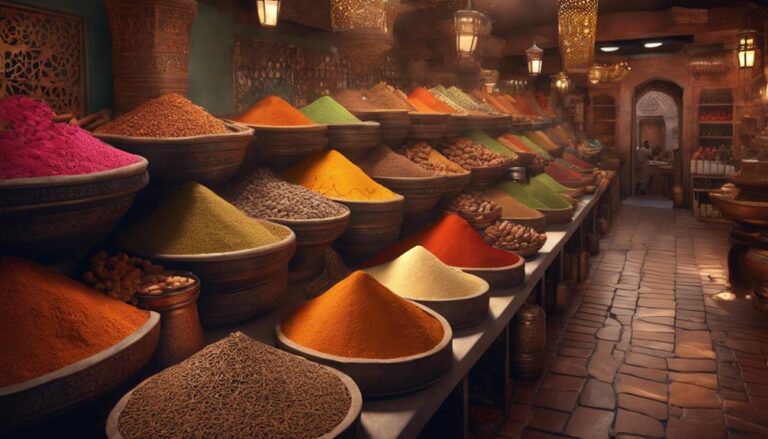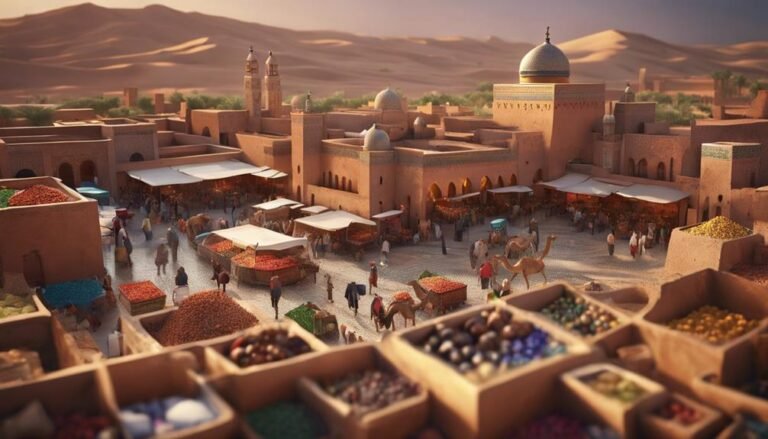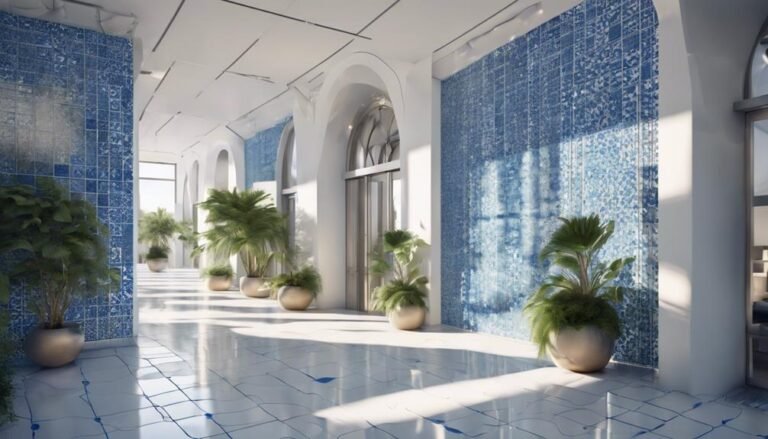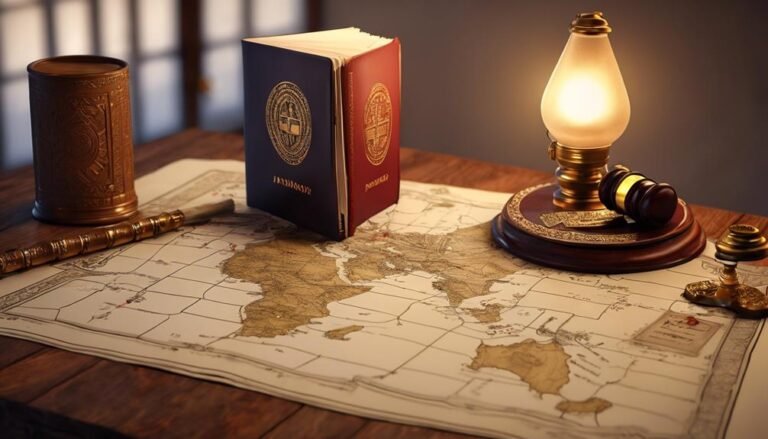Step into the vibrant world of Moroccan weddings, where men sport jellabas with fezes and women adorn luxurious caftans. The festivities kick off with pre-wedding rituals like the elaborate Henna Night, filled with intricate designs symbolizing protection and female bonding. On the big day, expect dazzling attire and lively processions like The Zaffe. Festive music blends traditional Moroccan sounds, while guests indulge in lavish tagine dishes and mint tea. Colorful decorations with henna-inspired patterns complete the enchanting ambiance. Immerse yourself in a celebration of love, unity, and rich culture, where each moment is a symphony of traditions.
Key Takeaways
- Moroccan weddings feature traditional attire like jellabas and caftans with intricate embroidery and jewelry.
- Pre-wedding ceremonies include henna nights with symbolic designs, music, dance, and gift exchanges.
- Festivities like Ammariya, Aarousa, and The Zaffe are essential wedding rituals.
- Vibrant music and dance create a jubilant atmosphere with a blend of cultural influences.
- Lavish Moroccan cuisine, colorful decorations, and lively music enhance the celebratory atmosphere.
Traditional Moroccan Attire
When attending a Moroccan wedding, you'll be captivated by the vibrant colors and intricate designs of the traditional Moroccan attire worn by the guests. Moroccan fashion is a beautiful display of cultural traditions and craftsmanship.
Men typically wear a jellaba, a long loose-fitting robe with intricate embroidery, paired with a fez, a brimless hat. The jellaba comes in various colors, with bright shades like red, blue, and green being popular choices. It's common to see men wearing leather babouches, traditional Moroccan slippers, completing their elegant look.
Women adorn themselves in stunning caftans, which are long, flowy dresses often made of luxurious fabrics like silk or satin. These caftans are richly decorated with intricate patterns, beading, and embroidery, showcasing the craftsmanship of Moroccan artisans. Women also wear elaborate jewelry, intricate henna designs on their hands, and style their hair in intricate braids or elegant updos.
The combination of colors and textures in Moroccan attire creates a visually striking and culturally significant aspect of the wedding celebration.
Pre-Wedding Ceremonies
Get ready to immerse yourself in the vibrant pre-wedding ceremonies of Moroccan traditions.
From the intricate Henna Night Tradition symbolizing joy and protection to the elaborate Gift Exchange Rituals signifying the union of families, each custom is steeped in rich symbolism.
The rhythmic beats of traditional music and the lively dancing set the stage for a celebration filled with love and anticipation.
Henna Night Tradition
In Moroccan weddings, the Henna Night tradition, also known as 'Laylat al-Henna,' is a vibrant pre-wedding ceremony where intricate henna designs, with deep cultural significance, are applied to the bride's hands and feet.
The bridal party, dressed in elaborate celebration attire, gathers for this joyous event filled with music, dance, and traditional rituals.
The henna designs not only symbolize beauty but also serve as a symbol of protection, good luck, and warding off evil spirits. The application of these designs is a skillful art passed down through generations, showcasing the rich heritage of Moroccan weddings.
The Henna Night creates a sense of anticipation and excitement, setting the tone for the upcoming wedding festivities.
Gift Exchange Rituals
Embracing the festive spirit of Moroccan weddings, the tradition of Gift Exchange Rituals during pre-wedding ceremonies adds a touch of cultural richness and significance to the celebratory events. These rituals hold deep cultural significance, reflecting symbolic gestures that symbolize blessings and good fortune.
Generational traditions are passed down through the exchange of gifts, creating meaningful exchanges between families. The items exchanged often include traditional Moroccan goods like ceramics, textiles, or even sweets, each carrying a unique significance.
The act of exchanging gifts not only symbolizes the union of the couple but also signifies the coming together of two families in harmony. These rituals create a sense of unity and respect, highlighting the importance of family and tradition in Moroccan weddings.
Music and Dancing
What role does music and dancing play in Moroccan pre-wedding ceremonies, and how do these cultural expressions enhance the celebratory atmosphere?
- Rhythmic Beats: Music in Moroccan pre-wedding ceremonies is characterized by rhythmic beats that set the tone for lively movements and joyous celebrations.
- Cultural Expressions: The music and dancing during these ceremonies are deeply rooted in Moroccan cultural expressions, showcasing traditional dances and songs that have been passed down through generations.
- Festive Celebrations: The combination of music and dancing creates a vibrant and festive atmosphere, where guests come together to celebrate the upcoming union with energy and enthusiasm.
- Community Bonding: Music and dancing serve as a means for the community to come together, participate in shared traditions, and express their happiness for the soon-to-be-wed couple.
Henna Night Rituals
During the vibrant Henna Night rituals, intricate designs are skillfully painted onto the bride's hands and feet, symbolizing joy, beauty, and blessings for her upcoming marriage. These henna designs hold deep cultural significance, often incorporating symbols of protection, fertility, and prosperity. The Henna Night brings together the women of both families, creating a space for female bonding and celebration. As the designs are carefully applied, a sense of anticipation fills the air, and the room is alive with laughter and chatter. The skilled henna artists weave traditional patterns with a modern flair, infusing each stroke with well-wishes for the bride's new journey.
Amidst the rhythmic beats of traditional music, the bride sits patiently as her friends and family take turns adorning her with these intricate designs. The process isn't only about the artistry but also about the shared experiences and stories exchanged between generations, strengthening the bonds of sisterhood and womanhood. Through this ancient ritual, the bride isn't only beautified but also enveloped in the love and support of her closest companions, setting the stage for the joyous union to come.
The Wedding Day Festivities
As you prepare for the wedding day festivities in Morocco, anticipate a day filled with traditional rituals, vibrant music, and lively dance performances.
The air will be alive with the sounds of drums and flutes, setting the stage for joyous celebrations that will carry on throughout the day.
Get ready to immerse yourself in the rich cultural tapestry of Moroccan weddings as you witness the colorful and spirited festivities unfold.
Traditional Rituals
Numerous traditional rituals infuse Moroccan wedding day festivities with rich cultural significance and vibrant celebrations.
- Henna Night: This pre-wedding ritual involves intricate designs being drawn on the bride's hands and feet with henna, symbolizing joy, beauty, and spiritual awakening.
- Ammariya: A ceremonial bath taken by the bride, accompanied by married women singing traditional songs to bless her marriage and cleanse her spirit.
- Aarousa: The presentation of the bride, where she's revealed in her stunning wedding attire to the guests, a moment filled with anticipation and admiration.
- The Zaffe: A lively procession typically led by musicians, belly dancers, and drummers, escorting the couple to the wedding venue amidst cheers and ululations, symbolizing joy and community support.
Festive Music and Dance
Amidst the traditional rituals that mark Moroccan weddings, the vibrant music and dance on the wedding day create a jubilant atmosphere filled with rhythmic beats and lively movements.
Energetic performances blend with cultural fusion, as the sounds of traditional instruments like the bendir and the guembri resonate through the air. Dancers dressed in colorful attire move gracefully to the celebratory rhythms, their movements telling stories of joy and unity.
The music, a mix of traditional Berber, Arabic, and Andalusian influences, sets the tone for the joyful celebrations that follow. Guests join in the festivities, clapping and swaying to the infectious melodies, creating a sense of togetherness that embodies the spirit of Moroccan weddings.
Rich Cultural Music and Dance
Immerse yourself in the vibrant rhythms and colorful movements of traditional Moroccan music and dance during a Moroccan wedding celebration.
- Traditional Instruments: Experience the enchanting sounds of instruments like the oud, qraqeb (metal castanets), and the bendir (a type of frame drum) that create an electrifying atmosphere.
- Dynamic Performances: Watch as skilled dancers perform the traditional Berber Ahidous or the Chaabi dance, mesmerizing guests with their rhythmic movements and intricate footwork.
- Call and Response: Join in the call and response style of singing, where a lead singer is followed by a chorus, creating an interactive and engaging musical experience for everyone present.
- Celebratory Atmosphere: Feel the energy and joy in the air as the music and dance bring people together, celebrating love and unity in a cultural extravaganza that's both mesmerizing and heartwarming.
Lavish Moroccan Cuisine
Indulge in the opulent world of Moroccan cuisine, where a rich tapestry of flavors, aromas, and textures awaits to tantalize your taste buds. Moroccan cuisine is renowned for its delicious flavors and extravagant presentation. At a Moroccan wedding feast, you can expect a lavish spread of dishes that reflect the country's diverse culinary influences.
Begin your culinary journey with a revitalizing Moroccan salad, a colorful mix of tomatoes, cucumbers, and olives dressed with zesty lemon and fragrant olive oil. Next, savor the iconic tagine dishes, where tender meat or vegetables are slow-cooked with a blend of aromatic spices like saffron, cumin, and cinnamon.
For a taste of something sweet, indulge in traditional Moroccan pastries like baklava, a decadent treat of flaky pastry layered with honey and nuts. Wash it all down with a cup of mint tea, a symbol of Moroccan hospitality.
The extravagant presentation of Moroccan cuisine reflects the country's emphasis on hospitality and generosity, making each meal a feast for the senses.
Colorful Wedding Decorations
Adorn your Moroccan wedding celebration with a vibrant array of colorful decorations that embody the rich cultural tapestry of Morocco. When it comes to creating an atmosphere that radiates joy and festivity, vibrant colors play a pivotal role in Moroccan wedding decorations. Here are four essential elements that you can incorporate to infuse your special day with cultural significance:
- Colorful Moroccan Lanterns: Hang intricately designed lanterns in vibrant hues like red, blue, and gold to create a warm and inviting ambiance that reflects traditional Moroccan craftsmanship.
- Bright Textile Drapes: Adorn your wedding venue with flowing textile drapes in rich colors such as saffron, emerald green, and deep purple to add a touch of luxury and elegance.
- Mosaic Table Centerpieces: Incorporate mosaic table centerpieces featuring geometric patterns and bold colors to pay homage to Morocco's famous mosaic artistry.
- Henna-Inspired Decor: Use henna-inspired patterns in vibrant tones of orange, red, and brown to decorate table runners, napkins, and other elements, symbolizing good luck and prosperity in Moroccan culture.
Conclusion
As you immerse yourself in the vibrant world of Moroccan weddings, you'll find yourself swept away by a whirlwind of colors, flavors, and traditions. Like a tapestry woven with threads of love and heritage, these celebrations are a feast for the senses.
From the intricate henna designs to the rhythmic beats of traditional music, each moment is a brushstroke painting a picture of joy and unity. Experience the magic of a Moroccan wedding and be forever changed.

The Editorial Team is a passionate group of Morocco enthusiasts dedicated to sharing the beauty, culture, and wonders of this captivating country. With diverse backgrounds and a deep love for travel, we strive to bring you engaging and informative content that inspires your Moroccan adventures. From uncovering hidden gems and sharing local insights to exploring mouthwatering cuisine and showcasing the vibrant lifestyle, our team is committed to providing you with valuable resources and exciting stories that enhance your exploration of Morocco. Join us on this journey as we celebrate the rich heritage and unforgettable experiences that make Morocco truly special.

